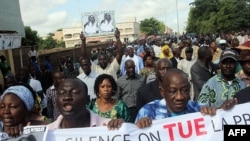DAKAR — Journalists in Mali are observing a "news blackout" and holding a march in the capital, Bamako, to protest kidnappings and beatings of journalists in recent months. Mali has become increasingly dangerous for reporters in the political chaos that has followed the March coup d’état.
Local news organizations halted production of newspapers and radio news programs Tuesday in response to violence against journalists in Mali - attacks local reporters say are reprisals for coverage about the country’s current political and security situation.
Bamako has been in political gridlock since the March 22 coup d’état, and the northern two-thirds of Mali has been in the hands of armed Islamic extremist groups for more than three months.
Ibrahim Coulibaly, a Bamako-based journalist and vice president of an editors’ association, says, in response to these acts against journalists, which are totally unacceptable, the Malian press is marching to the prime minister’s office. He invites all democrats in Mali to march with them.
In the latest incident, several armed and masked men broke into the offices of the newspaper L’Independant and kidnapped its director, El-Hadj Saouti Haïdara. He was held for hours, beaten, and left at the side of a road.
In past weeks at least five local journalists have been taken by armed masked men, either at home or in public venues, beaten and robbed.
“These attacks appear to be in reprisals for either their editorial line or articles that they write," said Mohamed Keïta, Africa advocacy coordinator for the Committee to Protect Journalists in New York. "It all appears to be political intimidation of independent journalists. This is all happening in total impunity. This is happening by armed men who target journalists. These are not random criminal incidents. These appear to be targeted politically motivated attacks on reporters.”
Keïta says prior to the coup d’état, the last violation his press watchdog group documented was in 2007. He says press freedom in Mali has taken a significant hit.
“Before the March 22 coup, Mali’s press was one of the freest in Africa," noted Keïta. "But we have seen this reversal, this slide, of press freedom, where journalists are being targeted, intimidated in total impunity. These attacks are a further challenge to the rule of law that is already weakened. And it is becoming one of the most dangerous and challenging environments for journalists to operate in to cover this important story.”
A communique last Friday from Mali’s interim government condemned the recent attacks on journalists, which it called “unacceptable in a democracy”. The government said it is ordering an investigation into the incidents.
Local news organizations halted production of newspapers and radio news programs Tuesday in response to violence against journalists in Mali - attacks local reporters say are reprisals for coverage about the country’s current political and security situation.
Bamako has been in political gridlock since the March 22 coup d’état, and the northern two-thirds of Mali has been in the hands of armed Islamic extremist groups for more than three months.
Ibrahim Coulibaly, a Bamako-based journalist and vice president of an editors’ association, says, in response to these acts against journalists, which are totally unacceptable, the Malian press is marching to the prime minister’s office. He invites all democrats in Mali to march with them.
In the latest incident, several armed and masked men broke into the offices of the newspaper L’Independant and kidnapped its director, El-Hadj Saouti Haïdara. He was held for hours, beaten, and left at the side of a road.
In past weeks at least five local journalists have been taken by armed masked men, either at home or in public venues, beaten and robbed.
“These attacks appear to be in reprisals for either their editorial line or articles that they write," said Mohamed Keïta, Africa advocacy coordinator for the Committee to Protect Journalists in New York. "It all appears to be political intimidation of independent journalists. This is all happening in total impunity. This is happening by armed men who target journalists. These are not random criminal incidents. These appear to be targeted politically motivated attacks on reporters.”
Keïta says prior to the coup d’état, the last violation his press watchdog group documented was in 2007. He says press freedom in Mali has taken a significant hit.
“Before the March 22 coup, Mali’s press was one of the freest in Africa," noted Keïta. "But we have seen this reversal, this slide, of press freedom, where journalists are being targeted, intimidated in total impunity. These attacks are a further challenge to the rule of law that is already weakened. And it is becoming one of the most dangerous and challenging environments for journalists to operate in to cover this important story.”
A communique last Friday from Mali’s interim government condemned the recent attacks on journalists, which it called “unacceptable in a democracy”. The government said it is ordering an investigation into the incidents.




